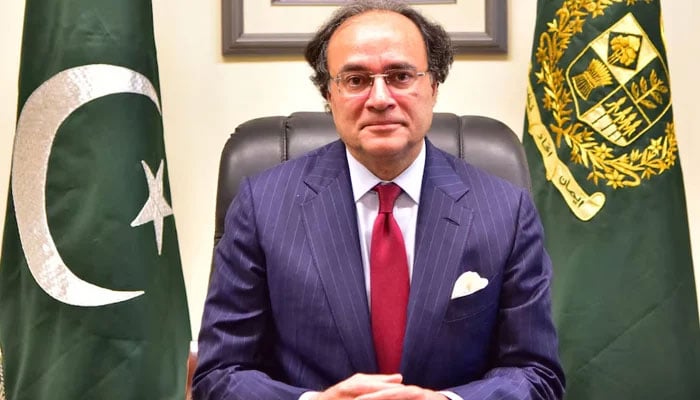No switch to put country on high-growth path from low growth: minister
Aurangzeb, a veteran banker who has served at Pakistan’s largest commercial banks, took oath as the finance minister on March 11
ISLAMABAD: Federal Minister for Finance and Revenues Muhammad Aurangzeb has said there is no automatic switch to take the country from the path of low to high growth as it requires changing the growth model from import dependence to export-led growth.
“As long as our growth remains dependent on import-led growth and until and unless we change this growth model towards export- led growth, there will be no sustainable growth. It happened when we moved from the growth rate of 2.5 to 6-7 percent range, then we had shortfall of dollars and were left with no option but to negotiate a tough programme with the IMF. Now from the next fiscal year, we will start making this transition from import dependence to export-led growth,” the finance minister said in his exclusive interview on Geo News programme ‘Aaj Shahzeb Khanzada Kay Saath’ on Wednesday.
He said Pakistan would launch the Panda bond in the next fiscal year in order to tap liquidity from the Chinese market. In the post-EFF scenario from the IMF, he said, the government would approach Middle Eastern banks and secure commercial financing and support from them to primarily help the country with the trade business, etc.
“The first quarter of 2024 is much better than the first quarter of 2023. GDP is better, there is macroeconomic stability, the exchange rate is also stable. We will now have to make this macro stability permanent,” he said.
The debt-ridden economy, which shrank 0.2% last year and is expected to grow around 2% this year, has been under extreme stress with low reserves, a balance of payment crisis, inflation at 23%, policy interest rates at 22% and record local currency depreciation.
Aurangzeb, a veteran banker who has served at Pakistan’s largest commercial banks, took oath as the finance minister on March 11, and faces an uphill task to stabilise the economy.
In the interview, the newly-appointed finance minister said he would reduce the leakages in revenue and cut expenditure in the PSDP through public-private partnership.
For expanding revenue, he said successive governments haven’t yet tapped China’s bond market, hoping that Pakistan would enter it in the ongoing year.
Ahead of the second and final review of the IMF’s $3 billion Standby Agreement (SBA), he said that Pakistan is in a good position in terms of fulfilling prerequisites.
The Fund will hold the second review of the SBA this week, the finance ministry and the IMF said earlier in the day, during which the government will also ask for a new longer-term bailout.
The four-day review begins on Thursday, and if successful, the IMF will release a final tranche of around $1.1 billion secured by Islamabad under a last-gasp rescue package last summer, averting a sovereign debt default.
“Pakistan has met all structural benchmarks, qualitative performance criteria and indicative targets for successful completion of the IMF review,” the ministry added, hoping for a successful IMF staff level agreement after the appraisal. In conversation with reporters a day earlier, the finance minister said Tuesday that Pakistan would seek a “large and long programme” from the IMF under the Extended Fund Facility (EFF).
-
 BTS Moments Of Taylor Swift's 'Opalite' Music Video Unvieled: See Photos
BTS Moments Of Taylor Swift's 'Opalite' Music Video Unvieled: See Photos -
 Robin Windsor's Death: Kate Beckinsale Says It Was Preventable Tragedy
Robin Windsor's Death: Kate Beckinsale Says It Was Preventable Tragedy -
 Rachel Zoe Shares Update On Her Divorce From Rodger Berman
Rachel Zoe Shares Update On Her Divorce From Rodger Berman -
 Kim Kardashian Officially Takes Major Step In Romance With New Boyfriend Lewis Hamilton
Kim Kardashian Officially Takes Major Step In Romance With New Boyfriend Lewis Hamilton -
 YouTube Tests Limiting ‘All’ Notifications For Inactive Channel Subscribers
YouTube Tests Limiting ‘All’ Notifications For Inactive Channel Subscribers -
 'Isolated And Humiliated' Andrew Sparks New Fears At Palace
'Isolated And Humiliated' Andrew Sparks New Fears At Palace -
 Google Tests Refreshed Live Updates UI Ahead Of Android 17
Google Tests Refreshed Live Updates UI Ahead Of Android 17 -
 Ohio Daycare Worker 'stole $150k In Payroll Scam', Nearly Bankrupting Nursery
Ohio Daycare Worker 'stole $150k In Payroll Scam', Nearly Bankrupting Nursery -
 Michelle Yeoh Gets Honest About 'struggle' Of Asian Representation In Hollywood
Michelle Yeoh Gets Honest About 'struggle' Of Asian Representation In Hollywood -
 Slovak Fugitive Caught At Milano-Cortina Olympics To Watch Hockey
Slovak Fugitive Caught At Milano-Cortina Olympics To Watch Hockey -
 King Charles Receives Exciting News About Reunion With Archie, Lilibet
King Charles Receives Exciting News About Reunion With Archie, Lilibet -
 Nvidia Expands AI Infrastructure With Nevada Data Centre Lease
Nvidia Expands AI Infrastructure With Nevada Data Centre Lease -
 Royal Family Shares Princess Anne's Photos From Winter Olympics 2026
Royal Family Shares Princess Anne's Photos From Winter Olympics 2026 -
 Tori Spelling Feels 'completely Exhausted' Due To THIS Reason After Divorce
Tori Spelling Feels 'completely Exhausted' Due To THIS Reason After Divorce -
 SpaceX Successfully Launches Crew-12 Long-duration Mission To ISS
SpaceX Successfully Launches Crew-12 Long-duration Mission To ISS -
 PlayStation State Of Play February Showcase: Full List Of Announcements
PlayStation State Of Play February Showcase: Full List Of Announcements




